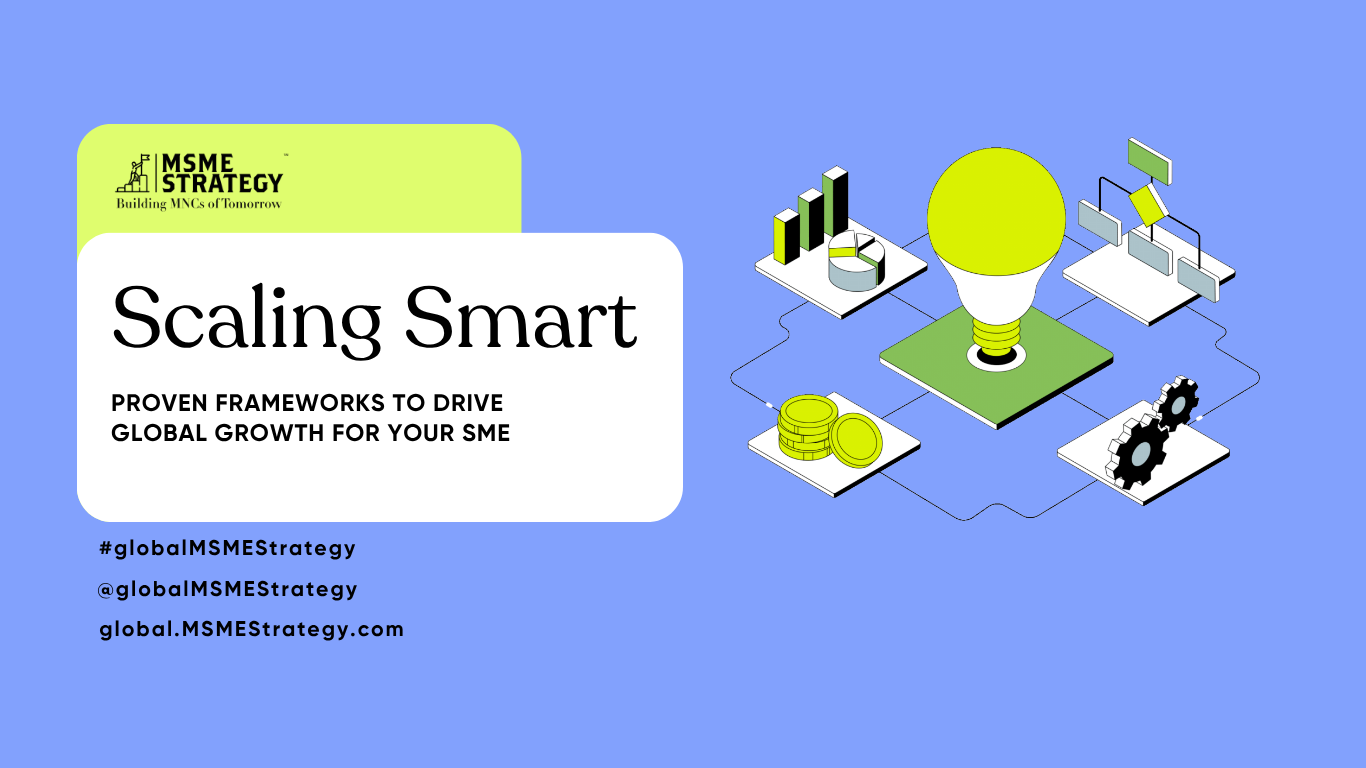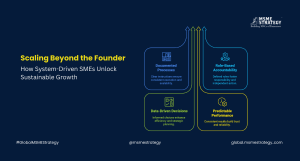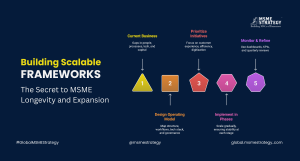The biggest challenge for SMEs isn’t just survival—it’s scaling sustainably. Whether you’re an early-stage startup or an established SME aiming to break through growth ceilings, adopting the right strategic framework can make the difference between stagnation and scalable success.
In this article, we explore globally recognized growth frameworks, how to implement them effectively, and the latest SME trends that are redefining scalable growth in 2025.
What Are Scalable Growth Frameworks?
A scalable growth framework is a structured approach that helps businesses align operations, resources, and strategic goals for exponential and sustainable growth. These frameworks offer clarity in decision-making, resource prioritization, team alignment, and execution monitoring. Most importantly, they help SMEs scale without compromising agility or customer value.
Popular Growth Frameworks for SMEs
- OKRs (Objectives and Key Results)
Widely adopted by global companies and now increasingly popular among SMEs, OKRs help businesses set ambitious goals and measurable outcomes. They drive transparency, team alignment, and performance focus. - Business Model Canvas (BMC)
Ideal for startups and growing SMEs, BMC allows businesses to visualize key elements like customer segments, value propositions, channels, and revenue streams. It’s especially useful for adapting to new markets or testing business pivots. - McKinsey 7S Framework
This framework emphasizes the interconnection between seven elements: Structure, Strategy, Systems, Shared Values, Skills, Style, and Staff. For SMEs transitioning from informal to more structured organizations, this is a useful diagnostic tool. - Scaling Up (Gazelles Methodology)
Developed by Verne Harnish, this methodology focuses on four key decisions: People, Strategy, Execution, and Cash. It’s highly practical for SMEs looking to grow beyond the founder-led stage. - The Lean Startup Methodology
Popular among tech SMEs and social enterprises, Lean Startup emphasizes validated learning, rapid experimentation, and customer feedback loops. It’s ideal for innovation-driven SMEs operating in uncertain markets.
Global Trends in SME Growth Frameworks (2025 Outlook)
- Digital-First Frameworks
From Africa to Southeast Asia, SMEs are integrating digital readiness into their growth models. Frameworks that embed digital tools—like cloud ERP, CRM automation, and AI-based analytics—are becoming the norm. - Platform-Based Scaling
SMEs are no longer just service or product providers—they’re becoming platforms. Many are adopting platform thinking (e.g., SaaS, marketplaces, digital communities) as part of their growth models. - ESG-Aligned Growth
In the EU, parts of South Asia, and Latin America, SMEs are integrating Environmental, Social, and Governance (ESG) goals into their growth frameworks. This not only builds brand trust but also opens access to impact investment. - Talent Resilience & Remote-First Strategy
Post-COVID frameworks include remote-ready operations, global hiring, and gig-based talent models. SMEs in North America and parts of Europe are scaling faster by leveraging global talent networks. - AI and Data-Driven Growth
From predictive sales analytics to AI-driven customer support, SMEs are embedding intelligence into their frameworks. Tools like ChatGPT, Notion AI, and Zoho’s AI suite are part of the modern SME’s scaling toolkit.
How to Use These Frameworks Effectively
- Choose Based on Stage: A startup may benefit from Lean Startup and BMC, while a growth-stage SME may benefit more from Scaling Up or OKRs.
- Align with Culture: Choose frameworks that complement your company culture and leadership style.
- Customize for Context: One size doesn’t fit all—local regulations, talent availability, and market maturity must be factored in.
- Train & Communicate: Get your team involved through training sessions and feedback loops.
- Track & Iterate: Use KPIs, OKRs, or dashboards to monitor progress and adjust regularly.
Actionable Takeaways for SMEs
- Pick one growth framework and pilot it in one department or project.
- Review your current business model using the Business Model Canvas.
- Set quarterly OKRs for your leadership team and cascade them downward.
- Conduct a McKinsey 7S diagnostic to identify structural bottlenecks.
- Use free digital tools (e.g., Trello, Notion, Zoho) to enable remote collaboration and tracking.
- Begin integrating AI for one core business function (e.g., customer service or sales forecasting).
- Invest in ESG alignment by documenting your social/environmental impact.
- Book a growth framework workshop or strategy session with a consultant.
Scaling an SME is not just about ambition—it’s about having the right framework to guide your journey. With global trends driving digital, platform-based, and impact-oriented growth, the time to invest in a strategic framework is now.
Need support applying these frameworks to your SME? The experienced consultants at MSME Strategy Consultants (global.msmestrategy.com) are ready to help you take the next step toward sustainable, scalable growth.
Hashtags:
#GlobalMSMEStrategy #SMEGrowth #ScalingSMEs #BusinessFrameworks #MSMESuccess #SMETrends2025 #GrowthMindset
Excerpts: Want to take your SME from steady to scalable? This article explores proven growth frameworks—like OKRs, Business Model Canvas, and Scaling Up—tailored for SMEs with global ambitions. Learn how to apply them effectively, discover 2025’s top trends in SME scaling, and get actionable strategies to future-proof your business. Global growth starts with the right framework.






